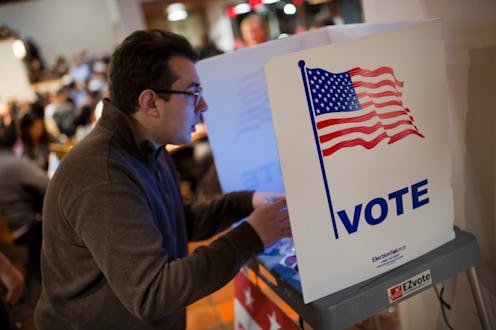News
Don't Forget To Vote In Local Elections!
About a year ago, as my town was in the midst of a considerable controversy over a proposed ordinance, I decided to start attending every city council meeting. I realized that despite considering myself "politically aware" and being on top of what was happening in Washington, I had no idea about what was going on at City Hall. I could give you intimate details on pending federal legislation about pollution regulations, but I couldn't name the members of the Planning Commission — the people with the power to decide whether a factory opened up shop next door. Attending these meetings changed the way I looked at politics, and it cemented my belief that it's critically important for people to vote all the way down the ticket, not just for federal candidates.
In 1980, a 39-year-old budding politician ran for mayor of Burlington, Vermont's largest city. Burlington is a nice place. You should check it out sometime. 36 years later, that same man ran for president, and made it almost all the way to the finish line. Bernie Sanders went from being the guy at City Hall whom only insiders and the weird people who show up to every city council meeting could recognize to being one of the most celebrated presidential candidates in U.S. history. He did so by climbing his way up the ladder of politics, jumping from mayor to congressman to senator, building relationships along the way. He could do this because in the 1980 mayoral election, some people voted for him.
I've been obsessed with electoral politics and elections themselves since I was a little kid, when our house was the polling place, which sent me into a tizzy of excitement every November. Once I was old enough to vote, I never missed a single election (though I did almost vote twice in the same one by accident). That enthusiasm has included local elections, though I confess that sometimes in the past, I've made judgments on the basis of the brief candidate statements in the voter guide because I'm too focused on what I think of as the big-picture things. Local politics aren't always as sexy and flashy as national politics, but that doesn't make it less important. In a strange way, they're often more important, because on the local level, your vote can make a profound difference.
Bernie Sanders went from being the guy at City Hall whom only insiders and the weird people who show up to every city council meeting could recognize to being one of the most celebrated presidential candidates in U.S. history... He could do this because in the 1980 mayoral election, some people voted for him.
If you're the kind of person who likes to look through historical election results in your area, you'll probably notice something: The further down the ticket you go, the fewer votes there are. Decisions about local ordinances, city council members, boards of supervisors, and other regional elections are sometimes decided on the margin of a few dozen votes, or even less. You could be one of those votes — so you could play a direct role in deciding what the world you live in right now is going to be like, on a very personal level.
But this also has larger implications. Maybe you don't care who's mayor (although you should). But you probably care about the implications of giving people a leg up in the political landscape. Your mayor could be running for president someday, which might be a good thing or a bad thing, depending on their politics. Remember all those months ago when the city council in Charlotte, NC ignited a firestorm with an anti-discrimination ordinance? Someone voted for those people, and maybe someday it will be Julie Eiselt or Patsy Kinsey, both of whom supported the ordinance, running for president. Less than 15 percent of eligible voters turned out for the 2015 election which gave those two women their seats. In fact, Kinsey ran unopposed, which is not uncommon in local and regional elections.
Voting all the way down the ballot can feel daunting, especially if you live in a big city. But you don't have to do it alone. Every year, a group of friends and I collaborate on election research, each of us doing a little chunk and bringing the information back to the group. It allows us to make informed decisions about ballot initiatives and candidates without having to reinvent the wheel. We don't always agree on everything, but at least we have the research on hand to make a solid case one way or the other. It means we're playing a much more conscious role in the politics that have a direct impact on our daily lives, while also shaping the politics of the future. People like Bernie Sanders have to come from somewhere, and so do people like Pat McCrory.
The election is fast approaching, and I know you've been exhorted to register to vote (and show up on election day) a million times, but please, register to vote. If you're not sure you're registered or don't know where to go, use Vote.org to check your status. Registrars periodically purge the rolls to eliminate deceased and inactive voters, and if you haven't voted in a while, you might have been caught up in the crossfire. Vote.org can also help you request an absentee ballot if you know you won't be present on Election Day, or if you live in a no-excuse state and you just want to have the option to vote at your own speed and mail your ballot in. Registration and absentee request deadlines are looming, though, so act quickly. This is your chance to not only decide who will be president on January 20, 2017, but also who will be running for president in 2052.
